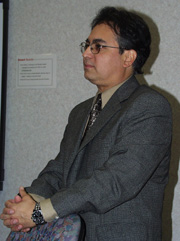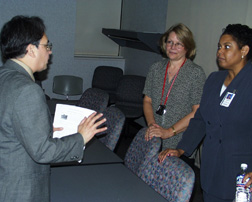 In commemoration of National Hispanic Heritage Awareness Month, the NHS/UNMC Employee Diversity Network sponsored a special presentation Sept. 26 by Jose Romero, M.D., associate professor of pediatrics infectious disease and chief recruitment officer of Latinos at UNMC.
In commemoration of National Hispanic Heritage Awareness Month, the NHS/UNMC Employee Diversity Network sponsored a special presentation Sept. 26 by Jose Romero, M.D., associate professor of pediatrics infectious disease and chief recruitment officer of Latinos at UNMC.
The program began with a brief travelogue on Mexico. Although the movie was a good representation of rural Mexico, Dr. Romero said, it is important to understand that Spanish-speaking people cover the globe — the majority in Spain, South, Central and North America and the Caribbean.
“One very important thing for everyone to understand is that the Latino people are a very heterogeneous population – one size does not fit all,” said Dr. Romero, who was born in Mexico.
“The initiatives for having appropriately trained Spanish language interpreters to better promote health care in the Latino communities are vital. You just can’t take me or somebody else off the street to translate and interpret for everybody. The same Spanish word in Spain may mean something completely different in Guatemala or California.”
According to the 2000 census, Hispanics comprise almost 12 percent of the American population and are the fastest growing population in the nation. In the state of Nebraska, Hispanics increased more than 150 percent between 1990 and 2000. The revitalization of a number of rural Nebraska towns in the last decade is directly related to Latino relocation.
Planting dreams
Dr. Romero sees Hispanic Heritage Month observances as opportunities to drive home to Latino youth the importance of Latino contributions in all areas of human activity, not just in the United States, but around the world. He also sees these activities as vehicles to explore both the historical and contemporary Latino condition and to dialog on issues of the day.
 |
Dr. Romero with Diane Ruskamp, left, Employee Diversity Network program coordinator, and Linda Cunningham, EDN co-chairperson. |
“Hispanic Heritage Awareness Month is an opportunity to look introspectively at what Latinos need to do to move forward,” Dr. Romero said. “We need to really move our young Latinos forward in terms of education. When we look at the number of Latinos actually attending college, it is very low. Part of this issue is from cultural awareness. The highest high school drop out rate is among Latinos. Our young people need to know that they can attain a college education with the right background. We need to develop an infrastructure that provides Latino children with the ability to navigate the system so that they can succeed in high school, college and post-college. We have to refocus at the grade school level and reach Latino children even earlier.”
Questions, answers
During the presentation, Dr. Romero responded to more than 20 questions from an audience of nearly 45 students, faculty and administrative staff members. The following are summations of Dr. Romero’s responses to some of the audience’s questions.
- On how to refer to Spanish-speaking people — “Hispanic is a government-derived term that was popularized by the Nixon administration. I prefer “Latino.” But the popular use of Latino or Hispanic really varies according to where you are in America. In the west, Latino is frequently used but many still refer to themselves as Chicanos, which arose from the United Farm Workers movement. In Florida, Hispanic is the popular word. In Northeast America, people use Latino and Hispanic interchangeably. In addition, there are still cultural — even racial — undertones to the use of certain words. Unfortunately, when some people use Hispanic, they are referring to the racially non-Indian, lighter-skinned, European-looking Spanish speakers. But the largest portions of Spanish speakers in America are from Mexico, Central and South America. Only one percent of Spanish speaking Americans are from Spain.”
- On bilingualism — “I am a proponent of bilingual education but I also want the Latinos brought into the mainstream system as fast as possible. Half of all the Latinos in America today are recent immigrants who don’t have any English speaking skills. So we need more people able to speak both languages. When I was growing up, my parents taught me in both languages. You can learn both languages at the same time, but certainly, living in America, the dominant language is English so all Latino children must become proficient in English — reading, writing and speaking. On the other hand, an uneducated person is a big problem, whether Latino, African American or Caucasian.”
- On undocumented immigrants overrunning America — “The vast majority of Latinos in America either have papers or became naturalized citizens. They are not undocumented. And even for those Hispanics in America who are undocumented, people should remember, they are still paying taxes. If they are working with a social security number, they are paying taxes. They are not taking money or jobs away from other Americans. Latinos often do much of the kind of labor that many Americans don’t want to do anymore. Americans benefit every day from the use of the same Latino labor force they criticize. Also, do you know how many Europeans are in America without proper documents? There’s a bias at work on this issue because a European undocumented worker can more easily blend into a majority Caucasian population, whereas the Latino worker is under a spotlight.”
- On cultural touchiness and asking questions that minorities may consider offensive — “If the question is legitimate and not intended to be demeaning, I don’t care how you word it, ask your question. I think people get a sense early on as to the agenda in a given discussion. Where there is a genuine attempt at dialog and understanding, ask your questions and Latino people will respond accordingly.
- Why haven’t Latinos moved very far politically? — “African Americans, for example, have been in this country for a much longer time and have identified core issues for their national development. Latinos have people who have been here a very long time and then a large portion who are recent immigrants. Because of this, it is difficult to get a national consensus on what are the most critical issues facing us nationally. For the old guard — second and even third generation Americans — education and employment advancement are important, while new immigrants are far more concerned with just surviving and getting a handle on daily life in America. We have to methodically encourage Latinos to register and vote and participate in the American political system the same way that African Americans do.
Breaking a time honored tradition
Dr. Romero ended his presentation with a poignant story about the value of education and how Latinos themselves often have to struggle against even time worn honorable traditions to meet the challenges of the future.
“Latinas (girls) drop out of high school at much higher rates than any other minority,” Dr. Romero said. “A lot of the time it’s because of pregnancies, but it’s also often cultural. Our women are still expected to give up their futures to stay home and take care of family members. This almost happened with my own sister.
“Today my sister is an obstetrician. When she was in high school, my grandmother became old and debilitated and began to develop Alzheimer’s disease. Grandma went to my father and said it was time for him to tell my sister to return home and carry on the tradition of looking after the elderly. This was a time honored cultural norm in Mexico for generations.
“But my father broke with one of the oldest family traditions and refused to pull my sister from school. That was a tremendous thing for my dad to do and I have never forgotten it. He shattered and broke a major cultural taboo among the Mexican people. It taught me that the Latino future is not about just what others are going to do for us, but what we are willing to do for ourselves to bring about change.”